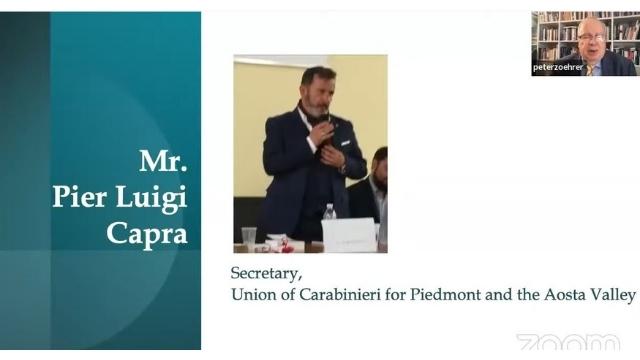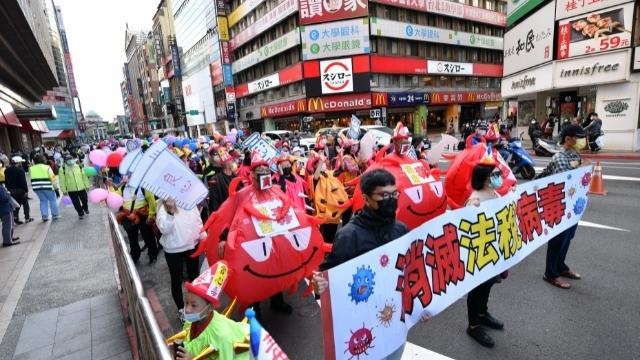02/02/2022 PIER LUIGI CAPRA
Participation means that good citizens should respect the law and the institutions, but when the governments make mistakes they have a right to protest.
by Pier Luigi Capra*
*A paper presented at the webinar “The Power of Education and the Tai Ji Men Case,” co-organized by CESNUR and Human Rights Without Frontiers on January 24, 2022, the International Day of Education.

I am the Regional Secretary for Piedmont and the Aosta Valley, in Italy, of the Italian Military Union, Military Police (Carabinieri). In fact, since its establishment, my organization has not dealt exclusively with matters of direct interest to the military, but has also promoted cultural events, including some, in cooperation with Fedinsieme, the organization founded by Francesco Curto, about interreligious dialogue.
It is through Francesco Curto that I became acquainted with Tai Ji Men and its respected founder, Dr. Hong Tao-Tze. I want to express my thanks to Francesco for having introduced me, with grace and patience, both to the activities of Tai Ji Men and to the Tai Ji Men case.
I share with Tai Ji Men a passion for transmitting a culture of peace to the world. Tai Ji Men carries out a precious work, and should be commended for its efforts to share the highest human values. I was also impressed by Dr. Hong’s work with the Association of World Citizens, and its promotion of the values of “good citizenship.” I found this particularly inspiring, as we are living in a world where the values of citizenship are at serious risk of being lost.
In fact, the cultural models of reference in our societies are more and more complicated, and interconnected between themselves. Yet, it is still possible to recognize their roots in ancient religious and spiritual rules, which are essential for social harmony. Again, the work of Tai Ji Men to protect these roots is essential. I agree with Dr. Hong when he teaches that the spiritual sphere permeates all reality, and is a fundamental dimension of the development of all human beings through conscience and knowledge.
The goal of the Tai Ji Men movement and Dr. Hong, then, is a worthy one. It is also ambitious, and is not without obstacles. We are fortunate to live in democratic societies, where citizens can freely express their opinions on various issues. This is possible through various forms of participation, including politics, trade unions (in which I am involved), or peaceful protest (emphasis on peaceful).
These are just some of the many forms of social participation available to every citizen. They produce their noblest effects on society when a peaceful dialogue between different points of view is allowed.
This dialogue allows each person to participate in the social life at different levels. Moreover, all these forms of participation share an important pedagogical relevance, i.e., they are important tools of education to active citizenship in a democratic society. We all know that participation is a fundamental element of democratic stability.
Participation is an important value recognized and emphasized at the international level. All citizens have the right to express their opinion, in accordance with the laws in force in each country, on all issues and decisions that affect them.
Participation is not only a right, it is also a duty, and a principle of action in the fields of health promotion, education, protection of civil rights, and so on.
The legal and administrative case that has involved Dr. Hong and Tai Ji Men is an opportunity for all of us for considering the instruments of social and political participation and their importance. The Tai Ji Men case is full of paradoxes. We see there the violation of the principle of equality, i.e., the principle according to which the same treatment must be applied under the same conditions and circumstances, including in the field of taxes. We also see there the violation of the principle of coherence of the legal system, i.e., of the non-contradiction between acts and norms within the same legal system.

Raising public awareness on these aspects is important, and it is useful to bring the case to international attention through the intervention of scholars and NGOs.
For all years, with the exception of 1992, the money contained in the “red envelopes” given by Tai Ji Men dizi (disciples) to their master was considered as gift and therefore tax-exempt. Only as far as 1992 was concerned, the tax regime applied was totally different.
Some could object that the legal case has been concluded, and a good citizen should respect the legal and administrative decisions. However, the principle of participation I have mentioned above implies that a good citizen, confronted with an error of the administrative or legal system, can peacefully activate the form of participation consisting in showing the error and its consequences, and call for its rectification.
Being good citizens is difficult; promoting the noblest values of a society of peace is difficult; persevering in the activities of building a society of peace is difficult—but not impossible.
I would like to see the resolution of the case affecting Tai Ji Men and Dr. Hong in the shortest possible time. I urge Tai Ji Men to continue to uphold the ideal of the good citizens: conscientious, respectful of institutions and laws, but also determined and brave when it comes to protect their rights, in a peaceful but firm way.
I hope to be able to meet Tai Ji Men dizi in person soon, and I wish them a good continuation of their work.
Source: Bitter Winter
